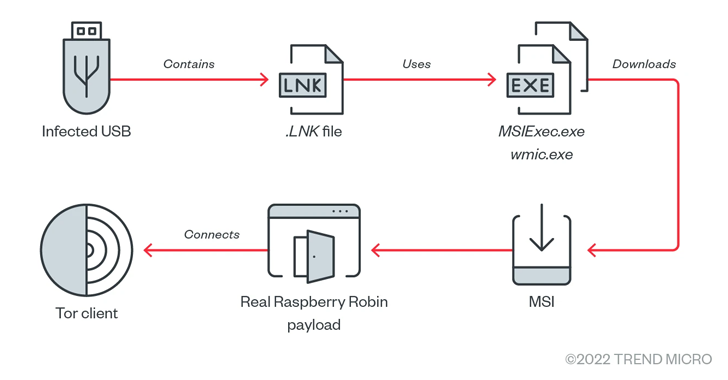The Raspberry Robin worm has been used in attacks against telecommunications and government office systems across Latin America, Australia, and Europe since at least September 2022.
“The main payload itself is packed with more than 10 layers for obfuscation and is capable of delivering a fake payload once it detects sandboxing and security analytics tools,” Trend Micro researcher Christopher So said in a technical analysis published Tuesday.
A majority of the infections have been detected in Argentina, followed by Australia, Mexico, Croatia, Italy, Brazil, France, India, and Colombia.
Raspberry Robin, attributed to an activity cluster tracked by Microsoft as DEV-0856, is being increasingly leveraged by multiple threat actors as an initial access mechanism to deliver payloads such as LockBit and Clop ransomware.
The malware is known for relying on infected USB drives as a distribution vector to download a rogue MSI installer file that deploys the main payload responsible for facilitating post-exploitation.
Further analysis of Raspberry Robin reveals the use of heavy obfuscation to prevent analysis, with the malware “composed of two payloads embedded in a payload loader packed six times.”
The payload loader, for its part, is orchestrated to load the decoy payload, an adware dubbed BrowserAssistant, to throw off detection efforts.

Should no sandboxing and analysis be observed, the legitimate payload is installed and proceeds to connect to a hard-coded .onion address using a custom TOR client embedded within it to await further commands.
The TOR client process masquerades as legitimate Windows processes like dllhost.exe, regsvr32.exe, and rundll32.exe, once again underscoring the considerable efforts made by the threat actor to fly under the radar.
What’s more, the malware’s real routine is run in Session 0, a specialized Windows session reserved for services and other non-interactive user applications to mitigate security risks such as shatter attacks.
Trend Micro said it found similarities in a privilege escalation and an anti-debugging technique used by Raspberry Robin and LockBit ransomware, hinting at a potential connection between the two criminal actors.
“The group behind Raspberry Robin is the maker of some of the tools LockBit is also using,” the company theorized, adding it alternatively “availed of the services of the affiliate responsible for the techniques used by LockBit.”
That having said, the intrusions appear to be a reconnaissance operation, as no data is returned from the TOR domain, suggesting that the group behind the malware is “testing the waters to see how far its deployments can spread.”
Source: thehackernews.com










